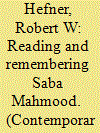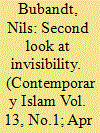|
|
|
Sort Order |
|
|
|
Items / Page
|
|
|
|
|
|
|
| Srl | Item |
| 1 |
ID:
167510


|
|
|
|
|
| Summary/Abstract |
Saba Mahmood's untimely passing on March 10, 2018 was a tragic loss for family, friends, and colleagues, as well as for cultural anthropologists inspired by her scholarship over the past two decades. Her influence has been no less far-reaching in contemporary Islamic and gender studies, as well as the anthropology of ethics. It is against the backdrop of her legacy that this essay seeks to pay homage to and critically reflect on Mahmood's scholarship. It focuses on and assesses Mahmood's contributions as an anthropologist of Islam, subjectivity, and ethics, paying particular attention to the debates that have emerged in the wake of her scholarship on the ethics of piety, the ambivalent nature of subjectivity, and the meanings of freedom and tradition. The assessment suggests that there is an unresolved tension between Mahmood's experience-near reflections on the ethical care of the pious self, on one hand, and her more sweeping critiques of freedom and the liberal project. The essay concludes with some thoughts on where the anthropology of Islam is moving with regard to ethics, plurality, and the ambivalence of subjectivity.
|
|
|
|
|
|
|
|
|
|
|
|
|
|
|
|
| 2 |
ID:
164018


|
|
|
|
|
| Summary/Abstract |
The Arab concept al-ghayb refers to the hidden, the unseen, the invisible. The term encompasses a range of important phenomena in Islam and in the everyday experiences of Muslims. The dominion of the unseen (alam al-ghayb) includes those parts of reality that cannot be seen simply because they are covered by other visible objects. It also refers to those phenomena that by their nature cannot be perceived (e.g. the face or throne of God, paradise, hell, the past, or the future), as well as those objects that are blocked from view by one’s perspective (Drieskens 2006; Mittermaier 2011; Suhr 2013). Al-ghayb is important to the notion of barzakh, the intermediary realm between life and death; to the issue of veiling; to visions of deceased saints or dreams about the Prophet Muhammad as well as to the uncontrollable powers of jinn, angels, magic, the evil eye, and omens (Pandolfo 1997;
|
|
|
|
|
|
|
|
|
|
|
|
|
|
|
|
|
|
|
|
|